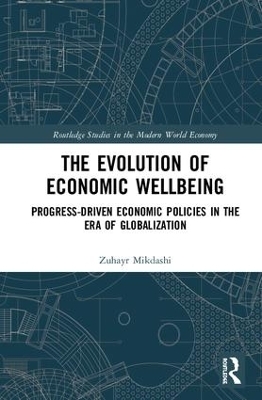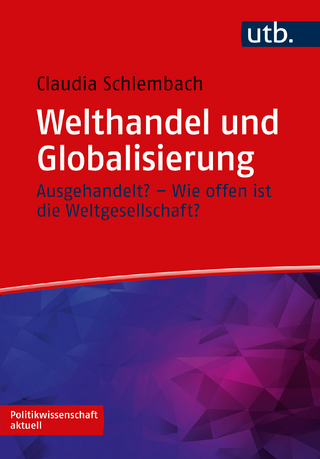
The Evolution of Economic Wellbeing
Progress-Driven Economic Policies in the Era of Globalization
Seiten
2019
Routledge (Verlag)
978-1-138-59466-1 (ISBN)
Routledge (Verlag)
978-1-138-59466-1 (ISBN)
The Evolution of Economic Wellbeing identifies the key factors, which the author refers to as "clusters of progress", that influence changes in wellbeing - both positively and negatively - within a framework of socio-economic globalization, instantaneous inter-connectedness, and rising environmental risks.
Throughout history, humans have sought to enhance their wellbeing across various domains. Though the spectrum of factors responsible for wellbeing has widened considerably and advances have been realized in scientific-technological fields, significant failures have been encountered in establishing peaceful relations among various communities, and the natural environment has been degraded inconsiderately by humans since the Industrial Revolution.
This book identifies the key factors that influence changes in wellbeing – both positively and negatively – within a framework of socio-economic globalization, instantaneous interconnectedness, and rising environmental risks. These 'clusters of progress' comprise essentially the following seven areas: bolstering peace and security; respecting universal fundamental values; satisfying personal and social basic needs; expanding knowledge and managerial-technological skills; promoting arts and culture; husbanding natural resources and protecting the environment; and concerting actions for the global common good.
The term 'progress' is used here to mean an all-embracing sustainable advancement towards desirable goals (be they material or non-material), offering higher levels of wellbeing to individuals and to society at large, compared to previous or current conditions.
In unravelling the 'progress conundrum', the author draws on his own original research and field work experiences which dovetail with those of other scholars by complementing their findings and/or by offering different appraisals. The author adopts an inter-disciplinary approach that overcomes the 'silo-like compartmentalization' of fields of study. The said approach enables us to reach a better understanding of the complex reality of progress (or regression) in various domains.
Throughout history, humans have sought to enhance their wellbeing across various domains. Though the spectrum of factors responsible for wellbeing has widened considerably and advances have been realized in scientific-technological fields, significant failures have been encountered in establishing peaceful relations among various communities, and the natural environment has been degraded inconsiderately by humans since the Industrial Revolution.
This book identifies the key factors that influence changes in wellbeing – both positively and negatively – within a framework of socio-economic globalization, instantaneous interconnectedness, and rising environmental risks. These 'clusters of progress' comprise essentially the following seven areas: bolstering peace and security; respecting universal fundamental values; satisfying personal and social basic needs; expanding knowledge and managerial-technological skills; promoting arts and culture; husbanding natural resources and protecting the environment; and concerting actions for the global common good.
The term 'progress' is used here to mean an all-embracing sustainable advancement towards desirable goals (be they material or non-material), offering higher levels of wellbeing to individuals and to society at large, compared to previous or current conditions.
In unravelling the 'progress conundrum', the author draws on his own original research and field work experiences which dovetail with those of other scholars by complementing their findings and/or by offering different appraisals. The author adopts an inter-disciplinary approach that overcomes the 'silo-like compartmentalization' of fields of study. The said approach enables us to reach a better understanding of the complex reality of progress (or regression) in various domains.
Zuhayr Mikdashi is the founding Director of the Institute of Banking and Financial Management, now the Institute of Banking and Finance, at the University of Lausanne, Switzerland.
1. Unravelling the "Wellbeing Conundrum" 2. GDP Growth Versus Wellbeing 3. "Value Pies": Roles of Governments, Businesses, and Markets 4. Case Studies 5. Evolving Wellbeing 6. Toward an Overaching Strategy 7. Appendix
| Erscheinungsdatum | 14.01.2019 |
|---|---|
| Reihe/Serie | Routledge Studies in the Modern World Economy |
| Zusatzinfo | 1 Tables, black and white; 3 Line drawings, black and white; 3 Illustrations, black and white |
| Verlagsort | London |
| Sprache | englisch |
| Maße | 156 x 234 mm |
| Gewicht | 566 g |
| Themenwelt | Wirtschaft ► Betriebswirtschaft / Management |
| Wirtschaft ► Volkswirtschaftslehre ► Wirtschaftspolitik | |
| ISBN-10 | 1-138-59466-0 / 1138594660 |
| ISBN-13 | 978-1-138-59466-1 / 9781138594661 |
| Zustand | Neuware |
| Informationen gemäß Produktsicherheitsverordnung (GPSR) | |
| Haben Sie eine Frage zum Produkt? |
Mehr entdecken
aus dem Bereich
aus dem Bereich
Theorie und Anwendung
Buch | Hardcover (2024)
Vahlen, Franz (Verlag)
CHF 55,70
wie sich unsere Wirtschaftspolitik ändern muss, damit wir globale …
Buch | Hardcover (2024)
Wiley-VCH (Verlag)
CHF 55,95
ausgehandelt? – wie offen ist die Weltgesellschaft?
Buch | Softcover (2024)
UTB (Verlag)
CHF 30,80


